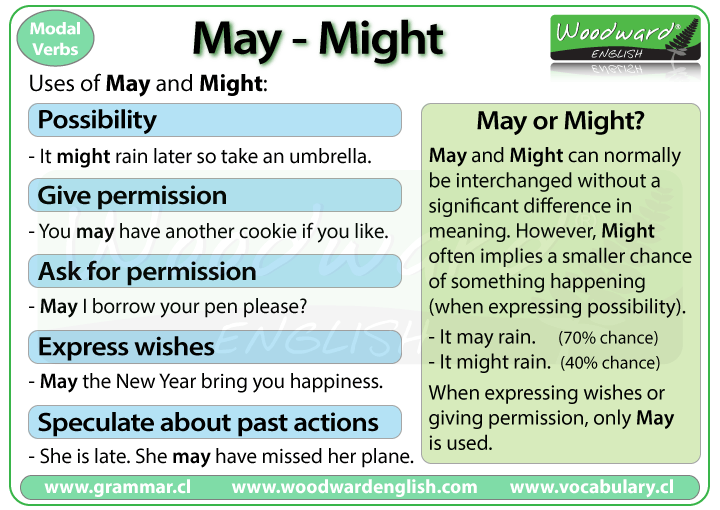May - Might
English Grammar - Modal Verbs
May and Might are modal verbs. They can normally be interchanged without a significant difference in meaning however Might often implies a smaller chance of something happening (when expressing possibility).
May and Might
1. To express (future) possibility
There is a chance that something is true or that there is a possibility of something happening.
Note: Might is used more frequently than May in spoken English.
- It might rain later (= it is possible that it will rain)
- I might go to the movies tonight. (Though I'm not sure)
- I wouldn't talk to Tim right now. He may still be angry after his team lost.
- He's very good, in fact, I think he may win the competition.
- She might be late because of the public transport strike.
2. To give permission
- You may leave the table once you have finished your meal.
- You may take only one brochure.
- If you have finished the exam, you may leave the room.
May not can be used to NOT give permission or to prohibit someone from doing something.
- You may not park your car in front of the gate.
- You may not take more than one brochure.
3. To ask for permission
Note: Can is used more frequently than May in spoken English though May sounds more polite.
- May I sit next to you?
- May I borrow your pen?
- May I use your bathroom please?
Note: Might could also be used to request permission but it sounds very old and is not common.
4. May: to talk about typical occurrences
May is used in academic (or scientific) language to refer to things that typically happen in certain situations.
- Drivers may feel tired if they do not take a break every 2 hours.
- Adults may find it difficult to sleep if they use technology before going to bed.
- These tablets may produce serious side effects if not taken in the correct dosage.
5. Speculate about past actions (May + have + past participle)
- She is late. I think she may have missed her plane.
- It may have already been broken before you bought it.
- What was that noise? It may have been a dog outside our window.
6. To express wishes
- May you both live a long and happy life together.
- May the New Year bring you love and happiness.
- May all your wishes come true.
- May the odds be ever in your favor.
- May the Force be with you. :)

May as well - Might as well
These are expressions can be used to suggest that you will do something because there is nothing better or more interesting to do.
- There is nothing on TV. I might as well go to bed.
- (At the stadium) Our team is losing by 50 points. We may as well go home because they're not going to win.
Next activity
See our notes about other Modal Verbs.
See the difference between May be and Maybe in English.
If you found this English Grammar about May and Might interesting or useful, let others know about it.
